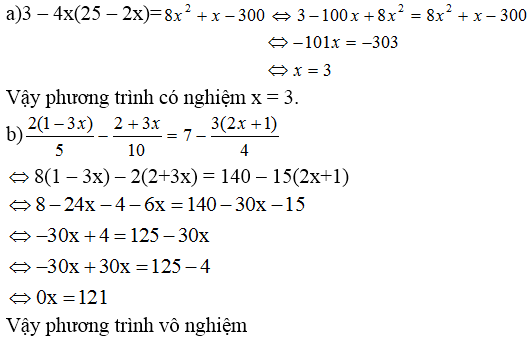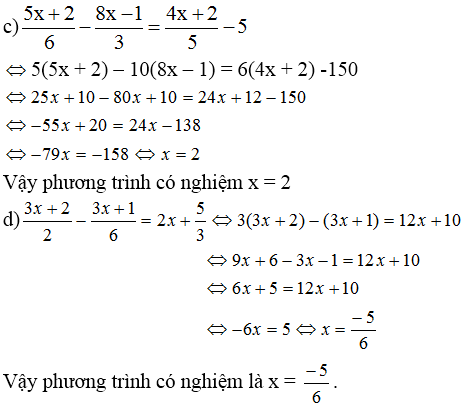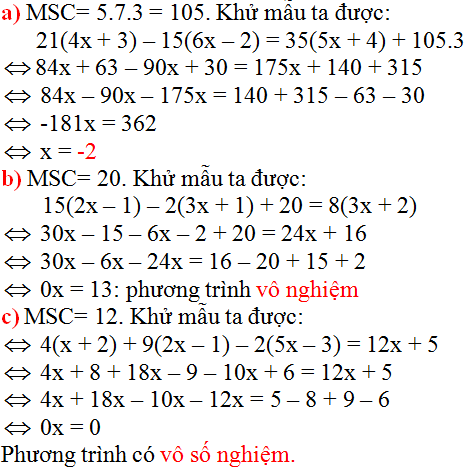Hãy nhập câu hỏi của bạn vào đây, nếu là tài khoản VIP, bạn sẽ được ưu tiên trả lời.

\(2x^4+3x^3+8x^2+6x+5=0\)
\(\Leftrightarrow2x^4+2x^3+2x^2+x^3+x^2+x+5x^2+5x+5=0\)
\(\Leftrightarrow2x^2\left(x^2+x+1\right)+x\left(x^2+x+1\right)+5\left(x^2+x+1\right)=0\)
\(\Leftrightarrow\left(x^2+x+1\right)\left(2x^2+x+5\right)=0\)
Mà \(x^2+x+1=\left(x+\frac{1}{2}\right)^2+\frac{3}{4}>0\forall x\)
\(2x^2+x+5=2\left[\left(x+\frac{1}{4}\right)^2+\frac{39}{16}\right]>0\forall x\)
Vậy tập nghiệm của pt là \(S=\varnothing\)
b, \(\frac{x-342}{15}+\frac{x-323}{17}+\frac{x-300}{19}+\frac{x-273}{21}=10\)
\(\Leftrightarrow\left(\frac{x-342}{15}-1\right)+\left(\frac{x-323}{17}-2\right)+\left(\frac{x-300}{19}-3\right)+\left(\frac{x-273}{21}-4\right)=0\)
\(\Leftrightarrow\frac{x-357}{15}+\frac{x-357}{17}+\frac{x-357}{19}+\frac{x-357}{21}=0\)
\(\Leftrightarrow\left(x-357\right)\left(\frac{1}{15}+\frac{1}{17}+\frac{1}{19}+\frac{1}{21}\right)=0\)
\(\Leftrightarrow x-357=0\Leftrightarrow x=357\)
Vậy tập nghiệm của pt: \(S=\left\{357\right\}\)

a, \(\dfrac{59-x}{41}+\dfrac{57-x}{43}+\dfrac{55-x}{45}+\dfrac{53-x}{47}+\dfrac{51-x}{49}=-5\)
\(\Leftrightarrow\left(\dfrac{59-x}{49}+1\right)+\left(\dfrac{57-x}{43}+1\right)+\left(\dfrac{55-x}{45}+1\right)+\left(\dfrac{53-x}{47}+1\right)+\left(\dfrac{51-x}{49}+1\right)=0\)
\(\Leftrightarrow\dfrac{100-x}{45}+\dfrac{100-x}{43}+\dfrac{100-x}{45}+\dfrac{100-x}{47}+\dfrac{100-x}{49}=0\)
\(\Leftrightarrow\left(100-x\right).\left(\dfrac{1}{41}+\dfrac{1}{43}+\dfrac{1}{45}+\dfrac{1}{47}+\dfrac{1}{49}\right)=0\)
Mà \(\left(\dfrac{1}{41}+\dfrac{1}{43}+\dfrac{1}{45}+\dfrac{1}{47}+\dfrac{1}{49}\right)\ne0\)
\(\Rightarrow100-x=0\)
\(\Rightarrow x=100\)
Vậy \(S=\left\{100\right\}\)
b, \(6x^2-5x+3=2x-3x\left(3-2x\right)\)
\(\Leftrightarrow6x^2-5x+3=2x-9x+6x^2\)
\(\Leftrightarrow6x^2-5x+3=-7x+6x^2\)
\(\Leftrightarrow6x^2-5x+3+7x-6x^2=0\)
\(\Leftrightarrow2x+3=0\)
\(\Leftrightarrow2x=-3\)
\(\Leftrightarrow x=\dfrac{-3}{2}\)
Vậy \(S=\left\{\dfrac{-3}{2}\right\}\)

giải pt sau
g) 11+8x-3=5x-3+x
\(\Leftrightarrow\) 8x + 8 = 6x - 3
<=> 8x-6x = -3 - 8
<=> 2x = -11
=> x=-\(\dfrac{11}{2}\)
Vậy tập nghiệm của PT là : S={\(-\dfrac{11}{2}\)}
h)4-2x+15=9x+4-2x
<=> 19 - 2x = 7x + 4
<=> -2x - 7x = 4 - 19
<=> -9x = -15
=> x=\(\dfrac{15}{9}=\dfrac{5}{3}\)
Vậy tập nghiệm của pt là : S={\(\dfrac{5}{3}\)}
g)\(\dfrac{3x+2}{2}-\dfrac{3x+1}{6}=\dfrac{5}{3}+2x\)
<=> \(\dfrac{3\left(3x+2\right)}{6}-\dfrac{3x+1}{6}=\dfrac{5.2+6.2x}{6}\)
<=> 9x + 6 - 3x + 1 = 10 + 12x
<=> 6x + 7 = 10 + 12x
<=> 6x -12x = 10-7
<=> -6x = 3
=> x= \(-\dfrac{1}{2}\)
Vậy tập nghiệm của PT là : S={\(-\dfrac{1}{2}\)}
\(h,\dfrac{x+4}{5}-x+4=\dfrac{4x+2}{5}-5\)
<=> \(\dfrac{x+4-5\left(x+4\right)}{5}=\dfrac{4x+2-5.5}{5}\)
<=> x + 4 - 5x - 20 = 4x + 2 - 25
<=> x - 5x - 4x = 2-25-4+20
<=> -8x = -7
=> x= \(\dfrac{7}{8}\)
Vậy tập nghiệm của PT là S={\(\dfrac{7}{8}\)}
\(i,\dfrac{4x+3}{5}-\dfrac{6x-2}{7}=\dfrac{5x+4}{3}+3\)
<=> \(\dfrac{21\left(4x+3\right)}{105}\)-\(\dfrac{15\left(6x-2\right)}{105}\)=\(\dfrac{35\left(5x+4\right)+3.105}{105}\)
<=> 84x + 63 - 90x + 30 = 175x + 140 + 315
<=> 84x - 90x - 175x = 140 + 315 - 63 - 30
<=> -181x = 362
=> x = -2
Vậy tập nghiệm của PT là : S={-2}
K) \(\dfrac{5x+2}{6}-\dfrac{8x-1}{3}=\dfrac{4x+2}{5}-5\)
<=> \(\dfrac{5\left(5x+2\right)}{30}-\dfrac{10\left(8x-1\right)}{30}=\dfrac{6\left(4x+2\right)-150}{30}\)
<=> 25x + 10 - 80x - 10 = 24x + 12 - 150
<=> -55x = 24x - 138
<=> -55x - 24x = -138
=> -79x = -138
=> x=\(\dfrac{138}{79}\)
Vậy tập nghiệm của PT là S={\(\dfrac{138}{79}\)}
m) \(\dfrac{2x-1}{5}-\dfrac{x-2}{3}=\dfrac{x+7}{15}\)
<=> \(\dfrac{3\left(2x-1\right)-5\left(x-2\right)}{15}=\dfrac{x+7}{15}\)
<=> 6x - 3 - 5x + 10 = x+7
<=> x + 7 = x+7
<=> 0x = 0
=> PT vô nghiệm
Vậy S=\(\varnothing\)
n)\(\dfrac{1}{4}\left(x+3\right)=3-\dfrac{1}{2}\left(x+1\right)-\dfrac{1}{3}\left(x+2\right)\)
<=> \(\dfrac{1}{4}x+\dfrac{3}{4}=3-\dfrac{1}{2}x-\dfrac{1}{2}-\dfrac{1}{3}x-\dfrac{2}{3}\)
<=> \(\dfrac{1}{4}x+\dfrac{1}{2}x+\dfrac{1}{3}x=3-\dfrac{1}{2}-\dfrac{2}{3}-\dfrac{3}{4}\)
<=> \(\dfrac{13}{12}x=\dfrac{13}{12}\)
=> x= 1
Vậy S={1}
p) \(\dfrac{x}{3}-\dfrac{2x+1}{6}=\dfrac{x}{6}-6\)
<=> \(\dfrac{2x-2x+1}{6}=\dfrac{x-36}{6}\)
<=> 2x -2x + 1= x-36
<=> 2x-2x-x = -37
=> x = 37
Vậy S={37}
q) \(\dfrac{2+x}{5}-0,5x=\dfrac{1-2x}{4}+0,25\)
<=> \(\dfrac{4\left(2+x\right)-20.0,5x}{20}=\dfrac{5\left(1-2x\right)+20.0,25}{20}\)
<=> 8 + 4x - 10x = 5 - 10x + 5
<=> 4x-10x + 10x = 5+5-8
<=> 4x = 2
=> x= \(\dfrac{1}{2}\)
Vậy S={\(\dfrac{1}{2}\)}
g) \(11+8x-3=5x-3+x\)
\(\Leftrightarrow8+8x=6x-3\)
\(\Leftrightarrow8x-6x=-3-8\)
\(\Leftrightarrow2x=-11\)
\(\Leftrightarrow x=-\dfrac{11}{2}\)
h, \(4-2x+15=9x+4-2x\)
\(\Leftrightarrow-2x-9x+2x=4-4-15\)
\(\Leftrightarrow-9x=-15\)
\(\Leftrightarrow x=\dfrac{-15}{-9}=\dfrac{5}{3}\)

\(\text{a) }\left|2-5x\right|=\left|3x+1\right|\\ \Leftrightarrow\left[{}\begin{matrix}2-5x=3x+1\\2-5x=-3x-1\end{matrix}\right. \Leftrightarrow\left[{}\begin{matrix}-5x-3x=1-2\\-5x+3x=-1-2\end{matrix}\right.\\ \Leftrightarrow\left[{}\begin{matrix}-8x=-1\\-2x=-3\end{matrix}\right.\Leftrightarrow\left[{}\begin{matrix}x=\dfrac{1}{8}\\x=\dfrac{3}{2}\end{matrix}\right.\)
Vậy tập nghiệm phương trình là \(S=\left\{\dfrac{1}{8};\dfrac{3}{2}\right\}\)
\(\text{b) }\dfrac{3}{4x-20}+\dfrac{15}{50-2x^2}+\dfrac{7}{6x+30}=0\)
ĐXKĐ của phương trình \(:x\ne\pm5\)
\(\text{Ta có }:\dfrac{3}{4x-20}+\dfrac{15}{50-2x^2}+\dfrac{7}{6x+30}=0\\ \Rightarrow\dfrac{3}{4\left(x-5\right)}+\dfrac{15}{2\left(25-x^2\right)}+\dfrac{7}{6\left(x+5\right)}=0\\ \Rightarrow\dfrac{3}{4\left(x-5\right)}-\dfrac{15}{2\left(x+5\right)\left(x-5\right)}+\dfrac{7}{6\left(x+5\right)}=0\\ \Rightarrow\dfrac{9\left(x+5\right)}{12\left(x+5\right)\left(x-5\right)}-\dfrac{90}{12\left(x+5\right)\left(x-5\right)}+\dfrac{14\left(x-5\right)}{12\left(x+5\right)\left(x-5\right)}=0\\ \Rightarrow9x+45-90+14x-70=0\\ \Leftrightarrow23x=115\\ \Leftrightarrow x=5\left(KTM\right)\)
Vậy phương trình vô nghiệm
\(\text{c) }\dfrac{x+29}{31}-\dfrac{x+27}{33}=\dfrac{x+17}{43}-\dfrac{x+15}{45}\\ \Leftrightarrow\left(\dfrac{x+29}{31}+1\right)-\left(\dfrac{x+27}{33}+1\right)=\left(\dfrac{x+17}{43}+1\right)-\left(\dfrac{x+15}{45}+1\right)\\ \Leftrightarrow\dfrac{x+60}{31}-\dfrac{x+60}{33}-\dfrac{x+60}{43}+\dfrac{x+60}{45}=0\\ \Leftrightarrow\left(x+60\right)\left(\dfrac{1}{31}-\dfrac{1}{33}-\dfrac{1}{43}+\dfrac{1}{45}\right)=0\\ \Leftrightarrow x+60=0\left(\text{Vì }\dfrac{1}{31}-\dfrac{1}{33}-\dfrac{1}{43}+\dfrac{1}{45}\ne0\right)\\ \Leftrightarrow x=-60\)
Vậy \(x=-60\) là nghiệm của phương trình

Câu a)
\(2x^4+3x^3+8x^2+6x+5=0\)
\(\Leftrightarrow (2x^4+2x^3+2x^2)+(x^3+x^2+x)+5x^2+5x+5=0\)
\(\Leftrightarrow 2x^2(x^2+x+1)+x(x^2+x+1)+5(x^2+x+1)=0\)
\(\Leftrightarrow (x^2+x+1)(2x^2+x+5)=0\)
\(\Rightarrow \left[\begin{matrix} x^2+x+1=0\\ 2x^2+x+5=0\end{matrix}\right.\Rightarrow \left[\begin{matrix} (x+\frac{1}{2})^2+\frac{3}{4}=0\\ 2(x+\frac{1}{4})^2+\frac{39}{8}=0\end{matrix}\right.\) (vô lý)
Vậy pt vô nghiệm.
Cách khác:
PT \(\Leftrightarrow 4x^4+6x^3+16x^2+12x+10=0\)
\(\Leftrightarrow 3x^4+(x^4+6x^3+9x^2)+7x^2+12x+10=0\)
\(\Leftrightarrow 3x^4+(x^2+3x)^2+(4x^2+12x+9)+3x^2+1=0\)
\(\Leftrightarrow 3x^4+(x^2+3x)^2+(2x+3)^2+3x^2=-1\)
(vô lý vì vế phải âm còn vế trái không âm)
Vậy pt vô nghiệm.
Câu b:
\(\frac{x-342}{15}+\frac{x-323}{17}+\frac{x-300}{19}+\frac{x-273}{21}=10\)
\(\Leftrightarrow \frac{x-342}{15}+\frac{x-323}{17}+\frac{x-300}{19}+\frac{x-273}{21}-10=0\)
\(\Leftrightarrow \frac{x-342}{15}-1+\frac{x-323}{17}-2+\frac{x-300}{19}-3+\frac{x-273}{21}-4=0\)
\(\Leftrightarrow \frac{x-357}{15}+\frac{x-357}{17}+\frac{x-357}{19}+\frac{x-357}{21}=0\)
\(\Leftrightarrow (x-357)\left(\frac{1}{15}+\frac{1}{17}+\frac{1}{19}+\frac{1}{21}\right)=0\)
Dễ thấy \(\frac{1}{15}+\frac{1}{17}+\frac{1}{19}+\frac{1}{21}\neq 0\), do đó $x-357=0$ hay $x=357$ là nghiệm duy nhất của pt.

Bài 1:
\(\frac{99-x}{101}+\frac{97-x}{103}+\frac{95-x}{105}+\frac{93-x}{107}=-4\)
\(\Leftrightarrow \frac{99-x}{101}+1+\frac{97-x}{103}+1+\frac{95-x}{105}+1+\frac{93-x}{107}+1=0\)
\(\Leftrightarrow \frac{99-x+101}{101}+\frac{97-x+103}{103}+\frac{95-x+105}{105}+\frac{93-x+107}{107}=0\)
\(\Leftrightarrow \frac{200-x}{101}+\frac{200-x}{103}+\frac{200-x}{105}+\frac{200-x}{107}=0\)
\(\Leftrightarrow (200-x)\left(\frac{1}{101}+\frac{1}{103}+\frac{1}{105}+\frac{1}{107}\right)=0\)
Vì \(\frac{1}{101}+\frac{1}{103}+\frac{1}{105}+\frac{1}{107}\neq 0\) nên suy ra \(200-x=0\Rightarrow x=200\)
Bài 2:
\(\frac{x+14}{86}+\frac{x+15}{85}+\frac{x+16}{84}+\frac{x+116}{4}=0\)
\(\Leftrightarrow \frac{x+14}{86}+1+\frac{x+15}{85}+1+\frac{x+16}{84}+1+\frac{x+17}{83}+1+\frac{x+116}{4}-4=0\)
\(\Leftrightarrow \frac{x+100}{86}+\frac{x+100}{85}+\frac{x+100}{84}+\frac{x+100}{83}+\frac{x+100}{4}=0\)
\(\Leftrightarrow (x+100)\left(\frac{1}{86}+\frac{1}{85}+\frac{1}{84}+\frac{1}{83}+\frac{1}{4}\right)=0\)
Vì \(\frac{1}{86}+\frac{1}{85}+\frac{1}{84}+\frac{1}{83}+\frac{1}{4}\neq 0\). Do đó \(x+100=0\Rightarrow x=-100\)





mẫu phân số thứ 3 bị gì thế
\(\dfrac{x+1}{11}-\dfrac{2x-5}{15}=\dfrac{3x-47}{17}-\dfrac{4x-59}{19}\)
\(\Leftrightarrow\left(\dfrac{x+1}{11}-1\right)-\left(\dfrac{2x-5}{15}-1\right)=\left(\dfrac{3x-47}{17}+1\right)-\left(\dfrac{4x-59}{19}+1\right)\)
\(\Leftrightarrow\dfrac{x-10}{11}-\dfrac{2\left(x-10\right)}{15}=\dfrac{3\left(x-10\right)}{17}-\dfrac{4\left(x-10\right)}{19}\)
\(\Leftrightarrow\dfrac{x-10}{11}-\dfrac{2\left(x-10\right)}{15}-\dfrac{3\left(x-10\right)}{17}+\dfrac{4\left(x-10\right)}{19}=0\)
\(\Leftrightarrow\left(x-10\right)\left(\dfrac{1}{11}-\dfrac{1}{15}-\dfrac{1}{17}+\dfrac{1}{19}\right)=0\)
\(\Leftrightarrow x-10=0\)
\(\Leftrightarrow x=10\)
Vậy x = 10